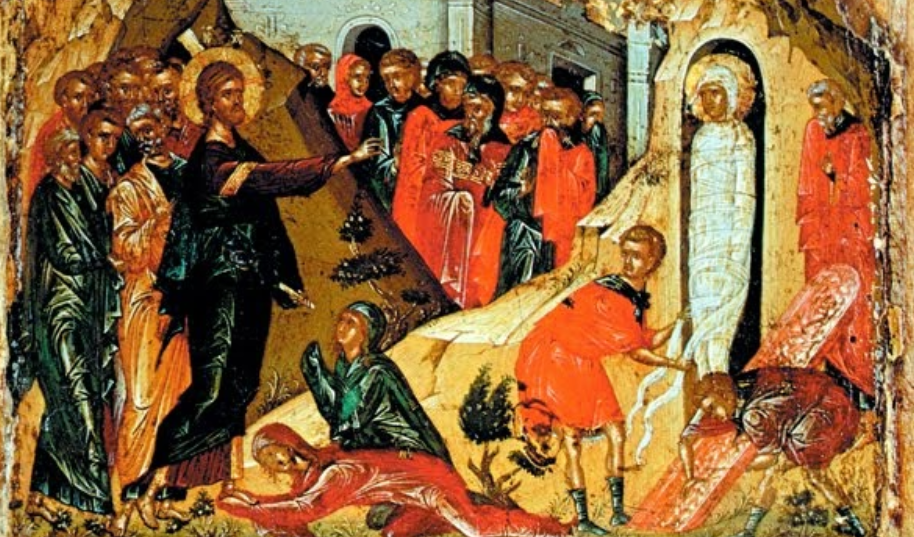Lazarus and bitterness

Lazarus has been in his tomb for four days by the time Jesus arrives. Ever proactive, Martha goes out to meet him. “Lord,” she says, “if you had been here, my brother would not have died. But even now I know that whatever you ask from God, God will give you” (John 11:21–22). Perhaps we sense reproach in these words. And yet Martha’s faith in Jesus is complete: Lazarus is dead, but she still believes her Lord can help.
Jesus responds, “Your brother will rise again” (John 11:23). Like many first-century Jews, Martha believes in an end-time resurrection of God’s people. “I know that he will rise again,” she replies, “in the resurrection on the last day” (John 11:24). But we can almost hear this grieving woman think, But what about now, Jesus? What about now? Why won’t you help me now?

In this moment, Martha stands where many Christians stand when faced with suffering. We have ultimate promises: one day Jesus will return and put the world to rights. But we are much more like children than philosophers. Our pain is real and urgent. It refuses to be soothed by faraway hope. Neat, theological answers will not do. But neither are they all that Christianity offers.
When Jesus finally comes, he does not fix Martha’s problem. Instead, he changes the terms of engagement. Jesus looks into this grieving woman’s eyes and says: “I am the resurrection and the life. Whoever believes in me, though he die, yet shall he live, and everyone who lives and believes in me shall never die. Do you believe this?” (John 11:25–26).

Is Jesus talking about Lazarus? Perhaps. Though he is physically dead, he trusted in Jesus, so he is truly, spiritually alive. But Jesus is not talking to Lazarus—not yet. He is talking to Martha, who is reeling from Lazarus’s death—a death that has cost her emotionally, and likely also jeopardized her security at a time when most women depended on male relatives for support. Martha longs to have Lazarus back. But Jesus looks her in the eye and says, “I am the resurrection and the life.” As you stand here in your desperate grief, your greatest need is not to have your brother back again. It’s to have me.
This statement is yet more shocking than Jesus’s failure to come in the first place. Far from being the “good moral teacher who never claimed to be God” of modern mythology, Jesus here claims not that he is offering good guidelines for life but that he himself is life: life in the face of suffering, life in the face of death.

All parents know that, at times, they must let their children suffer. We hold our crying babies still while strangers stick needles into their healthy flesh. They look at us through tears of betrayal, and we cannot explain that we are making them suffer now to save them from future disease.
Some parents are faced with a far harder task: allowing doctors to poison their children with drugs that ravage their bodies, making them vomit and lose their hair as they lie shut up in a hospital for days, or weeks, or months.

The pain is bitter, but with this cruel course, these parents hope to save their child’s life. The question we must always ask of suffering is this: What could possibly be worth it? Jesus’s flabbergasting claim is that he is. But this play has two more acts.

Jesus Wept
Martha responds with stunning faith: “Yes, Lord; I believe that you are the Christ, the Son of God, who is coming into the world” (John 11:27). But then she calls Mary, who falls at Jesus’s feet, weeping, and repeats her sister’s reproach, “Lord, if you had been here, my brother would not have died” (John 11:32). Jesus is deeply moved and troubled.
He asks where Lazarus has been laid. And then we encounter one of the shortest and most confusing verses in the Bible: “Jesus wept” (John 11:35). These words are strange because we know how easily these tears could have been spared. If Jesus had only come when he was called, no one would be crying. The bystanders observe, “See how he loved him!” But some also wonder, “Could not he who opened the eyes of the blind man also have kept this man from dying?” (John 11:36–37).
We have all had the experience of being comforted by someone who does not truly understand what we are going through. It is often unsatisfying. But Jesus is no remote deity, watching suffering from a safe distance. He is the God who inhabits our suffering.

The prophet Isaiah calls the Messiah, “a man of sorrows, and acquainted with grief” (Isa. 53:3), and we see in the Gospels how Jesus is moved with compassion for suffering people. This compassion goes beyond sympathy. Jesus does not just feel sorry for us in our weakness and pain. He takes that agony on himself.
Surely he has borne our griefs,
and carried our sorrows.
Isaiah continues,
He was pierced for our transgressions;
he was crushed for our iniquities;
upon him was the chastisement that brought us peace,
and with his wounds, we are healed. (Isa. 53:4–5)
In this prophecy, grief, suffering, and sickness are rolled up together with sin and guilt and loaded onto the Messiah’s back. And when Jesus comes, he carries that load. He bears the moral weight of guilt and sin in our place. But he also bears the heartbreak of our suffering.
Jesus holds us close as we lament. He weeps with us as we weep. He knows the end of the story when he will wipe every tear from our eyes. But this does not stop him from cleaving to us in our pain. In fact, pain is a place of special intimacy with him.
We see this in our own lives. We can laugh with anyone. But we cry with those closest to us, and the bond is strongest when their suffering connects with ours. In Jesus, we find the one person who knows all our heartache and all our pain.
Left by those closest to him, beaten by strangers, stripped and abused and hung up on a cross to die—there is no wound of ours he cannot touch. He has even experienced abandonment by his Father. On the cross he cried out with the words of Psalm 22:1, “My God, my God, why have you forsaken me?” (Matt. 27:46).
- Jesus knows his resurrection is coming. And yet he cries out in his distress. Jesus knows the end of Mary and Martha and Lazarus’s story. And yet he weeps.

“Lazarus, Come Out!”
When Jesus comes to Lazarus’s tomb, he has deeply moved again, and he commands that the stone be taken away. Martha cautions him, “Lord, by this time there will be an odour, for he has been dead four days” (John 11:39). But Jesus insists. He prays. Then he shouts, “Lazarus, come out!” And the man who has died comes out (John 11:43–44).
Jesus’s power over death is absolute. I believe it is the only hope we have in the face of our inevitable end. But what fascinates me about this story is how little focus there is on Lazarus himself.
Rather, the narrative draws our gaze to profound questions: Why, if Jesus planned to heal Lazarus, did he not just do so in the first place? Why did he let Lazarus die, and leave Mary and Martha mourning for days? Why not tell Martha what he was planning to do right away? In this strange stretching of the story, we get a glimpse of the whole biblical framework for suffering. The space between Lazarus’s death and Jesus’s calling of him out of the tomb is the space in which Martha sees Jesus for who he really is: her very life.
This story illuminates both suffering and prayer. We often see prayer as a means to an end: God is a cosmic vending machine; insert prayer and expect results to drop into your hand—or kick the machine in anger when they don’t. But the story of Lazarus upends this idea. Jesus is not a means to an end, a mechanism through which Martha can change her circumstances. He is the end.
Her circumstances drive her to him. It’s not that her suffering or our suffering doesn’t matter: it matters enough to bring tears to the eyes of the Son of God! But it matters like a first meeting matters to marriage, or like birth matters to motherhood. It is an entry point to the relationship, a relationship formed through suffering as much as through joy. If, as Jesus claims, the goal of our existence is a relationship with him, finding him in our suffering is the point.
Author: McLaughlin, R.

